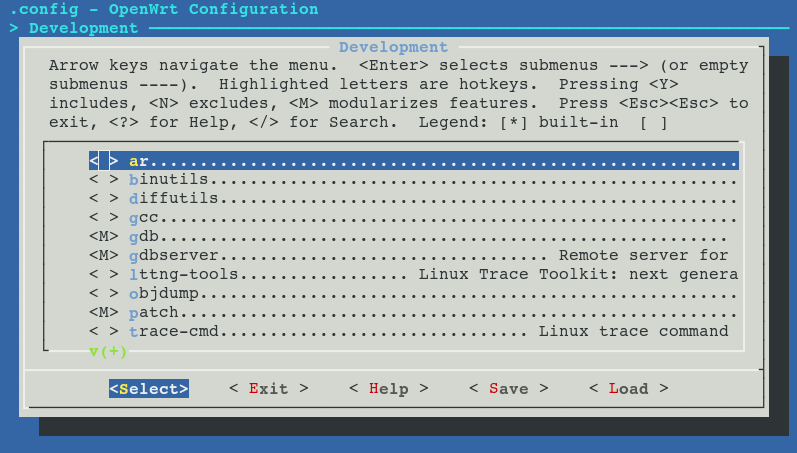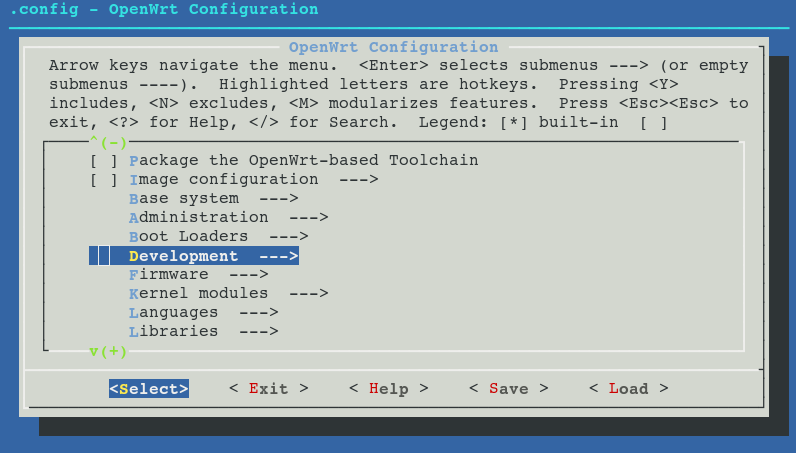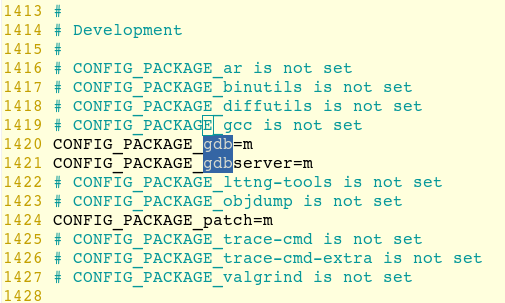Introduction
为调试Linux机器上的C/C++程序,我们通常使用GDB. 但要调试那些在路由器上 跑的C/C++程序,GDB还能胜任么?毕竟,我们又不能直接把源码搁到路由器上编译,在Linux机器上编的话还 牵扯到交叉编译(Cross Compiling)。
答案是Yes. 在本文中,我就将给大家介绍如何搭建GDB调试环境, 如何调试一个比Hello world复杂那么一点点的C程序的方法。
由于我使用的是OpenWrt 14.07 (Barrier Breaker),因此, 也假设你也使用的这个版本并对如何编译ipk软件包有一定的了解。Barrier Breaker的官方仓库在这儿:
$ git clone git://git.openwrt.org/14.07/openwrt.git BarrierBreaker.git
Compiling GDB Tools
在make menuconfig的时候启用GDB
Advanced configuration options (for developers) → Toolchain Options → Build gdb

以及gdbserver
Development → gdbserver

将gdbserver选为M,保存退出。
可以打开 .config 进行查看:

###Solution to the “Remote ‘g’ packet reply is too long” problem
在你编译之前呢,我这儿有一个免费的patch送给你, 可以避免你以后遇到像下面这样儿式的问题:
771,735 28^error,msg="Remote 'g' packet reply is too long:
00000000f8ffffffecceea7740b4ff7701000000446eff7f4c6eff7f2067e17f0000000046b8000000408a860200
000000031c7fffffffff00000000c816e977226fff7f1c0b4000906dff7f0088e777f8208900fcce450000004400
1cdc450087040000ac8a4000fefcf87c00000000a003eb77c86cff7fc86cff7f4c17e97713a40001a07023002900
0000a0c1e47724008010bc8a4000ffffffffffffffffffffffffffffffffffffffffffffffffffffffffffffffff
ffffffffffffffffffffffffffffffffffffffffffffffffffffffffffffffffffffffffffffffffffffffffffff
ffffffffffffffffffffffffffffffffffffffffffffffffffffffffffffffffffffffffffffffffffffffffffff
ffffffff00000000000000000000000000000000000000000000000000000000000000000000000000000000"
700-FIX-REMOTE-G-PACKET-REPLY-TOO-LONG.PATCH
--- a/gdb/remote.c
+++ b/gdb/remote.c
@@ -6110,8 +6110,19 @@ process_g_packet (struct regcache *regca
buf_len = strlen (rs->buf);
/* Further sanity checks, with knowledge of the architecture. */
- if (buf_len > 2 * rsa->sizeof_g_packet)
- error (_("Remote 'g' packet reply is too long: %s"), rs->buf);
+ // if (buf_len > 2 * rsa->sizeof_g_packet)
+ // error (_("Remote 'g' packet reply is too long: %s"), rs->buf);
+ if (buf_len > 2 * rsa->sizeof_g_packet) {
+ rsa->sizeof_g_packet = buf_len;
+ for (i = 0; i < gdbarch_num_regs (gdbarch); i++) {
+ if (rsa->regs[i].pnum == -1)
+ continue;
+ if (rsa->regs[i].offset >= rsa->sizeof_g_packet)
+ rsa->regs[i].in_g_packet = 0;
+ else
+ rsa->regs[i].in_g_packet = 1;
+ }
+ }
/* Save the size of the packet sent to us by the target. It is used
as a heuristic when determining the max size of packets that the
编译TOOLCHAIN中的GDB和PACKAGE中的GDBSERVER
将700-fix-remote-g-packet-reply-too-long.patch搁到toolchain/gdb/patches/目录下
cp /path/to/700-fix-remote-g-packet-reply-too-long.patch toolchain/gdb/patches/
这时候, 你如果ls一下大约可以看到这些:
$ ls toolchain/gdb/patches/
100-ppc_compile_fix.patch 600-fix-compile-flag-mismatch.patch
110-no_extern_inline.patch 700-fix-remote-g-packet-reply-too-long.patch
-
编译gdb工具链
make toolchain/gdb/{clean,compile,install} V=s
-
编译准备安装到OpenWRT上的gdbserver
make package/devel/gdb/{clean,prepare,compile} V=s
将GDBSERVER扔到路由器上并安装上
scp bin/ramips/packages/base/gdbserver_7.5-1_ramips_24kec.ipk root@192.168.1.1:/tmp/
路由器上opkg怎么update,怎么装ipk包不用我说了吧?
Add debugging to a package
A more complex Hello world in C
FILE LISTINGS
- 文件清单列表如下:
$ tree package/hello
package/hello
|-- Makefile
`-- src
|-- hello.c
|-- Makefile
|-- mytest.c
`-- mytest.h
hello/src/hello.c
#include
#include "mytest.h"
int main(int argc, char *argv[])
{
int i = 0;
printf("Command line: ");
for (i = 0; i < argc; i++) {
printf("%s ", argv[i]);
}
printf("\n");
int a = 9, b = 5;
testfunc(a, b);
printf("Hello OpenWrt\n");
return 0;
}
hello/src/mytest.h
#ifndef _MY_TEST_H_
#define _MY_TEST_H_
void testfunc(int a, int b);
#endif
hello/src/mytest.c
#include "mytest.h"
#include
void testfunc(int a, int b)
{
int sum = a + b;
int mul = a * b;
printf("Sum of %d and %d is %d\n", a, b, sum);
printf("%d * %d = %d\n", a, b, mul);
}
hello/src/Makefile
override CFLAGS += -Wall -Os -Wextra
.PHONY:compile clean
HELLO_OBJ = $(subst .c,.o,$(wildcard *.c))
HELLO_BIN = hello
compile:clean $(HELLO_OBJ)
$(CC) -o $(HELLO_BIN) $(HELLO_OBJ) $(LDFLAGS)
%.o:%.c mytest.h
$(CC) -o $@ -c $< $(CFLAGS) clean: @rm -r hello *.o 2>/dev/null || :
hello/Makefile
#
# Copyright (C) 2014-2015 Liu Jiaming <jmliu@smartecs.net>
#
# This is free software, licensed under the GPL 2 license.
#
include $(TOPDIR)/rules.mk
PKG_NAME:=hello
PKG_VERSION:=0
PKG_RELEASE:=1
PKG_BUILD_DIR := $(BUILD_DIR)/$(PKG_NAME)
include $(INCLUDE_DIR)/package.mk
define Package/hello
SECTION:=utils
CATEGORY:=Utilities
TITLE:= Hello World
MAINTAINER:=Liu Jiaming <jmliu@smartecs.net>
endef
define Package/hello/description
Hello world example for OpenWrt
endef
define Build/Prepare
mkdir -p $(PKG_BUILD_DIR)
$(CP) ./src/* $(PKG_BUILD_DIR)/
endef
define Build/Configure
endef
TARGET_CFLAGS += \
-I$(STAGING_DIR)/usr/include \
-D_GNU_SOURCE \
-ggdb3
MAKE_FLAGS += \
CFLAGS="$(TARGET_CFLAGS)" \
LDFLAGS="$(TARGET_LDFLAGS)"
define Package/hello/install
$(INSTALL_DIR) $(1)/usr/bin
$(INSTALL_BIN) $(PKG_BUILD_DIR)/hello $(1)/usr/bin/hello
endef
$(eval $(call BuildPackage,hello))
Methods for adding debugging to a package
- 法1: Add CFLAGS to package Makefile and recompile it. # 推荐
正如上面hello/Makefile文件做的那样,为hello软件包的Makefile添加CFLAGS。并重新编译
TARGET_CFLAGS += -ggdb3
-
法2: Recompile the package with CONFIG_DEBUG set # 设置CONFIG_DEBUG=y来编包
make package/hello/{clean,compile} V=99 CONFIG_DEBUG=y
-
法3: Enable debug info in menuconfig #在全局编译构造环境中启用调试开关
Global build settings → Compile packages with debugging info
这法2和法3是OpenWrt官方wiki上(http://wiki.openwrt.org/doc/devel/gdb )提到的方法,没试验过。
请将编译好的带调试信息的hello软件包扔到路由器上安装
Starting GDB
Start gdbserver on target (router)
路由器(IP为192.168.1.1)的9000端口上跑gdbserver
[root@MyRouter:/tmp]# gdbserver :9000 /usr/bin/hello Adjustment BarrierBreaker Calmer
Process /usr/bin/hello created; pid = 411
Listening on port 9000
Start gdb on host (in compiling tree)
宿主系统(Host System,比如我的是Ubuntu最近的某个版本)上跑gdb
./scripts/remote-gdb 192.168.1.1:9000 ./build_dir/target_*/hello/hello
Now gdb shell is up. Set breakpoints, start program, backtrace etc.
这样gdb shell就起来了。设置断点, 启动程序,查看堆栈,就跟以前一样。
(gdb)b testfunc
Breakpoint 1 at 0x4007d0: file mytest.c, line 5.
(gdb)c
(gdb)bt
#0 testfunc (a=a@entry=9, b=b@entry=5) at mytest.c:5
#1 0x00400600 in main (argc=4, argv=0x7fff6df4) at hello.c:14
Tips
- The output of hello got printed to the ROUTER console, rather than the Host system terminal (注意,hello包的输出是打印到路由器的控制台(console/terminal)上的,而非宿主系统上。)
- Always try to use “target remote 192.168.1.1:9000” on Host System In the gdb shell on the Host system, please always use “target remote 192.168.1.1:9000” to reconnect when the Router process brought up by gdbserver exits and then restarts, as in this way, your previous settings of breakpoints, watchpoints are reserved. (当路由器上gdbserver带起的进程退出后重新带起的时候,请不要直接将宿主系统上的gdb shell退出重进。 在原gdb shell中使用”target remote 192.168.1.1:9000″即可,这样做的好处是,你原先关于断点、监测点的设定都会保留住。)
文档信息
--------------
* 作者:
* 版权声明:自由转载-非商用
* 转载: []